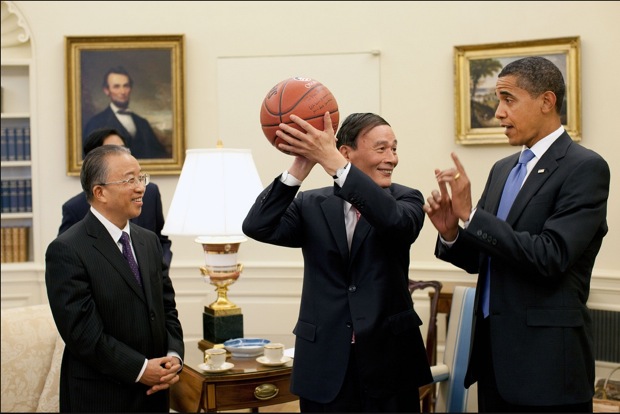Ahead of Visit, U.S. Senators Petition China’s Vice Premier on Intellectual Property, Indigenous Innovation, and Beef
A bipartisan group of U.S. senators on Monday asked China’s Vice Premier Wang Qishan to resolve several “longstanding irritants to the U.S.-China economic relationship” ahead of the Chinese dignatory’s visit next week to participate in an annual trade summit in Washington D.C. [https://broadbandbre

Chinese Vice Premier Wang Qishan (center) with U.S. President Barack Obama at the White House July 2009. Wang was there to discuss the results of the first U.S.-China Strategic and Economic Dialogue.
A bipartisan group of U.S. senators on Monday asked China’s Vice Premier Wang Qishan to resolve several “longstanding irritants to the U.S.-China economic relationship” ahead of the Chinese dignatory’s visit next week to participate in an annual trade summit in Washington D.C.
The senators in particular complained that China is not enforcing intellectual property rights as stringently as it could be, and that U.S. companies are being blocked from the China market by protectionist “indigenous innovation” policies.
The senators, led by Senate Finance Committee Chairman Max Baucus, D-Mont. and ranking member Chuck Grassley, R-Iowa, urged the Chinese government to make good on its 2006 commitment to ensure that all of its staff use legally-bought software instead of pirated copies.
The bipartisan group also called the Chinese out about their ongoing efforts to promote “indigenous innovation” at the expense of U.S. companies.
Chinese officials over the past few years have expressed concern about becoming too reliant on foreign technologies, and have made a concerted push to be self-reliant.
“We fully respect and encourage China’s efforts to build a robust domestic innovative sector, but to be successful, China must engage in these efforts without explicitly or implicitly discriminating against U.S. companies,” the senators wrote. “Discrimination will deter collaboration with, and investments from cutting-edge American innovators that can help build China’s own innovative sector.”
The senators also noted that the Chinese are still blocking beef imports.
They authored the letter a week ahead of a visit to Washington, D.C. by Wang, the unflappable, straight-shooting 62-year-old former mayor of Beijing.
He is scheduled to participate in an annual trade summit with the United States called the U.S.-China Joint Commission on Commerce and Trade. Wang will meet with both U.S. Commerce Secretary Gary Locke, U.S. Trade Representative Ron Kirk and Agriculture Secretary Tom Vilsack.
The joint commission was created in 1983 for both countries to iron out trade disputes and to explore commercial opportunities. Last year’s meeting took place in Hangzhou, China.
Last month, U.S. trade officials said that they are investigating whether China’s support of its clean energy sector is a violation of World Trade Organization rules.
Last year, Chinese officials promised to remove the requirement that 70 percent of wind turbine equipment be sourced from domestic manufacturers.
China followed up on that promise this January, but then the following month two departments in President Hu Jintao’s administration’s promulgated new rules that said that only majority-owned Chinese companies could participate in China’s offshore wind market.
“In most cases, it’s just a matter of China treating U.S. companies fairly,” said Grassley in a statement issued Thursday. “For example, China has policies that give preferences to wind turbines built in China. That puts Iowa’s wind turbine manufacturers at a disadvantage.”
In October testimony about China’s trade policies, John Frisbie, the U.S.-China Business Council’s president, also noted that U.S. clean energy companies are discriminated against in China because the government inevitably chooses the cheapest products even though U.S. products might be more efficient and higher quality.
China’s efforts to boost its new energy vehicle industry is also troubling, Frisbie said.
Draft regulations would require foreign auto makers to share their new energy vehicle technologies with their joint venture partners so that the locals can receive a “mastery” designation with the technology.
It is commonplace for companies that share their intellectual property in China to be copied and then undercut, as a Monday story in the Wall Street Journal concerning Russian fighter jets shows.
Technology companies from around the world who have set up shop in China are frequently in litigation over the issue.
A November report issued by the U.S. China Economic and Security Review Commission found that China had not lived up to the commitments it made when it joined the World Trade Organization.
“The 2010 annual report reflects the commission’s conclusions that China has failed to fulfill the promises it made nine years ago when it joined the World Trade Organization,” said the commission’s Chairman Dan Slane when it issued the report mid-November.
“Specifically, China is adopting a highly discriminatory policy of favoring domestic producers over foreign manufacturers,” he added. “Under the guise of fostering ‘indigenous innovation’ in its economy, the government of China appears determined to exclude foreigners from bidding on government contracts at the central, provincial and local levels. In addition, China has proposed that its many state-owned corporations be exempt from WTO rules on procurement. The Chinese government quite similarly intends to wall off a majority of the economy from international competition.”
Both Baucus and Grassley charged the U.S. International Trade Commission this April with investigating the economic impact of China’s perceived lackluster intellectual property enforcement efforts and its indigenous innovation policies on the U.S.. The first report is due to be published sometime mid-December after Wang’s visit.
In their Monday letter, the U.S. senators urged the commission to resolve these issues ahead of Chinese President Hu Jintao’s visit to the United States next month.
Photo: Pete Souza, the White House.









Member discussion